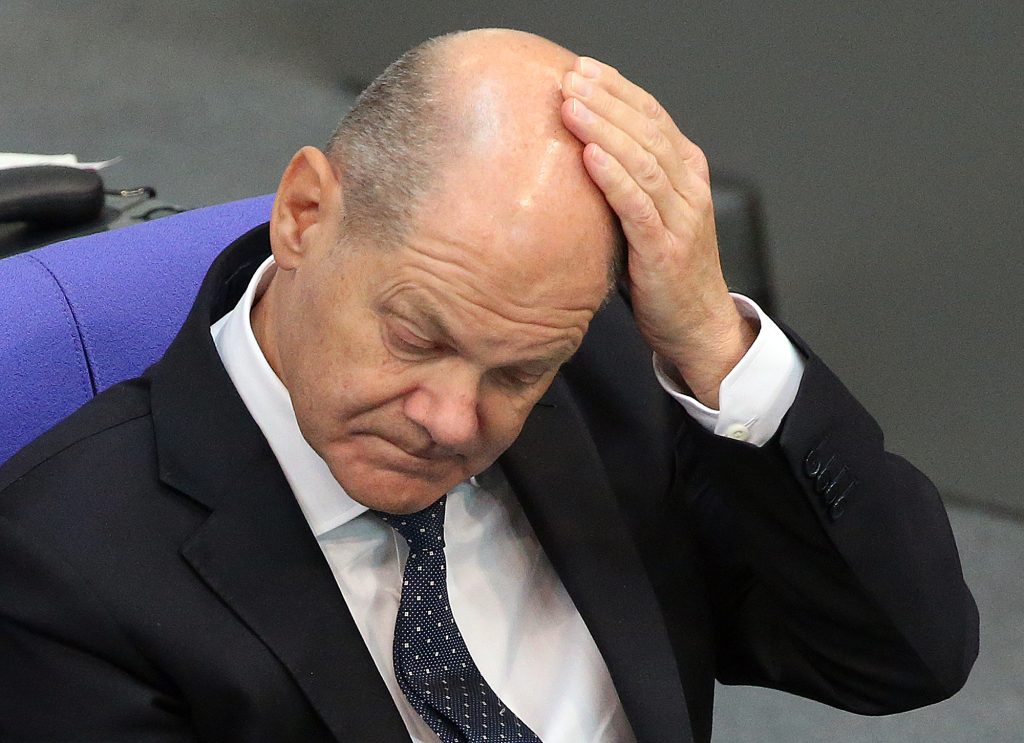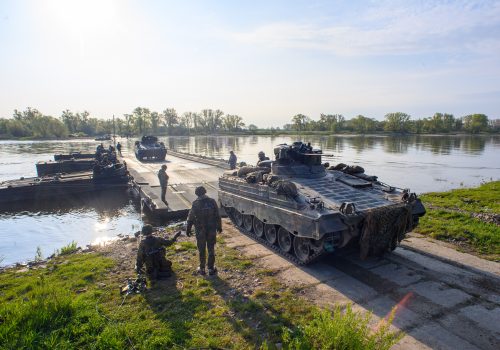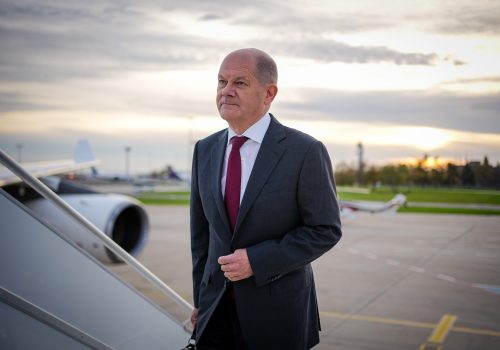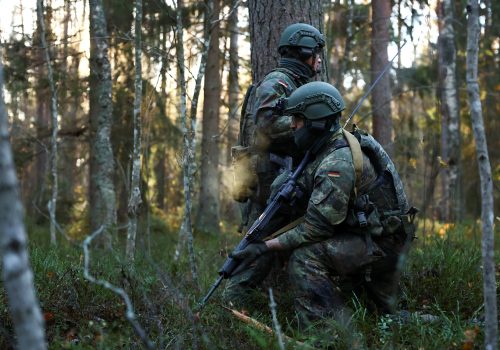Germany’s relationship with its own security looks fundamentally different one year after the war in Ukraine prompted Chancellor Olaf Scholz to announce a Zeitenwende, or turning point, before the Bundestag. The idea represented an about-face that promised greater investment in the German armed forces and a rethink of Berlin’s relationship with Moscow—raising hopes on both sides of the Atlantic. But as the meaning of Zeitenwende has grown to represent broader transformations to Berlin’s security, defense, and economic policies, the chancellor has routinely missed the mark and gotten in the way of his own big idea.
The Zeitenwende is the chancellor’s brainchild, yet he has been its major roadblock. Since announcing the speech, the Social Democratic Party (SPD) leader has habitually hesitated when faced with key decisions, best encapsulated by the Leopard 2 battle tank saga. Despite the international pressure, which eventually reached a fever pitch, for Germany to send its Leopards and approve European shipments to Ukraine, Scholz abdicated, only making Leopards contingent on US deliveries of less logistically viable Abrams tanks. Looking ahead, the early debate about fighter jets for Ukraine is following the same pattern. Scholz already appears to have labeled planes for Ukraine a red line.
The repeated public diplomacy disasters do Scholz and Germany a disservice. Navel-gazing in Berlin diverts attention away from the fact that Germany is, among European Union member countries, the largest supporter of Ukraine—supplying heavy machinery, Patriot missiles, and more. Despite that, international focus has landed on Germany’s delay in approving or providing critical materiel. During instances in which Germany is given the opportunity to advance the Zeitenwende agenda by displaying leadership from Berlin, Scholz squanders the moment acting only after maximum pressure is applied by governments in Washington, Tallinn, and everywhere in between. A true Zeitenwende will require Germany to lead from the front, not defer to a US decision for fear of Germany “going it alone.” The Leopards debate showcases this: Inaction on the highly desired Leopard tanks was Germany going it alone.
Nobody expects the sea change in German foreign-policy thinking that is Zeitenwende to happen overnight. Even so, Berlin should seize the opportunities it has to move the strategy forward and prove Germany’s willingness to be the leader in Europe.
Others in Berlin recognize this opportunity. Foreign Minister Annalena Baerbock, the Green Party’s first candidate for chancellor with a significant shot, has been the most outspoken voice in favor of transforming German security and projecting strength vis-à-vis Russia and China, as exemplified by her August speech to the New School in New York in which she called on Germany to “seize this transatlantic moment.” Elsewhere, SPD Chair Lars Klingbeil, in a new foreign-policy strategy paper for the party, recently advocated for Germany to take a strong leadership role in the world. German Economy Minister Robert Habeck, of the Green Party, has previously urged against “stupid trade” with China—showing a shift in German foreign-policy thinking away from the belief that economic ties with autocracies is the best way to bring about change.
This next generation of German policymakers is prepared to reinvigorate German foreign policy—that is a good sign for Zeitenwende hopefuls. In the meantime, Scholz needs to stop inhibiting the foreign-policy transformation. The first opportunity for the chancellor to recoup lost trust is ensuring the successful, swift delivery of the now-promised Leopards to Ukraine. The implementation cannot resemble the decision process. Yet Germany’s new defense minister, Boris Pistorius, was noncommittal on a delivery date for the Leopards in a February 16 interview with the Washington Post.
Scholz must also apply today’s lessons to challenges beyond Ukraine. Looking to Germany’s neighborhood, Scholz has emphasized the need for a strong and capable Europe that is not reliant solely on the United States for security. Yet, following the chancellor’s “you first, Washington” approach to sending tanks to Ukraine, countries such as Poland and the Baltic states will need reassurances that he is serious about reducing Europe’s reliance on the United States. In an effort to recover confidence in Germany’s European leadership abilities, Scholz should look for avenues for easy cooperation with his European neighbors. One easy win for Scholz and Pistorius could be coordinating with allies to refill tank stockpiles.
The Zeitenwende needs to look beyond Europe as well. The chancellor’s latest writing on the Zeitenwende pays little attention to China, while the development of Germany’s much anticipated national security strategy has reportedly been paused by the chancellery for being too sharp on Beijing after the strategy left Baerbock’s foreign ministry. To avoid falling into a renewed economic-dependence trap with China, Scholz should follow Baerbock’s lead in treating Beijing as a competitor, consistent with the renewed emphasis on German and European security prescribed by the Zeitenwende. You can bet this will be a topic of discussion when Scholz meets with US President Joe Biden at the White House on March 3.
The Zeitenwende is a process that will take time and require patience from Berlin’s allies. Yet, it is also one that requires clarity from Germany’s highest levels. At February’s Munich Security Conference, the chancellor remarked that Germany will assume the responsibility required of it in times like these. In the interest of turning words into action, a break from the ever-repeating cycle of hesitancy and seesawing would be a welcome development from the chancellery and will help ensure the Zeitenwende becomes reality.
Noah DeMichele was a fall 2022 young global professional with the Europe Center and is currently working on transatlantic relations at Bertelsmann Foundation North America.
Further reading
Fri, Jan 6, 2023
Experts react: Can new French and German weapons turn the tide in Ukraine?
New Atlanticist By
What do these additions mean for the battlefield? What do they signal about the positioning of France, Germany, and Europe as a whole in this protracted conflict?
Thu, Nov 3, 2022
Germany can’t afford to fumble the ‘Zeitenwende’
New Atlanticist By Rachel Rizzo, Jörn Fleck
Plodding Germany will be forced to adapt its role in Europe and the world much sooner than it expects. Here's why.
Wed, Nov 2, 2022
German defense state secretary: What ‘Zeitenwende’ really means
New Atlanticist By
As she travels to Washington this week to meet with US defense officials and others, Siemtje Möller breaks down her country's historic shift in mindset and force posture.
Image: Chancellor Olaf Scholz (SPD) follows the speeches of the parliamentary groups in the German Bundestag after his government statement. Photo via DPA/Picture Alliance and Reuters.



